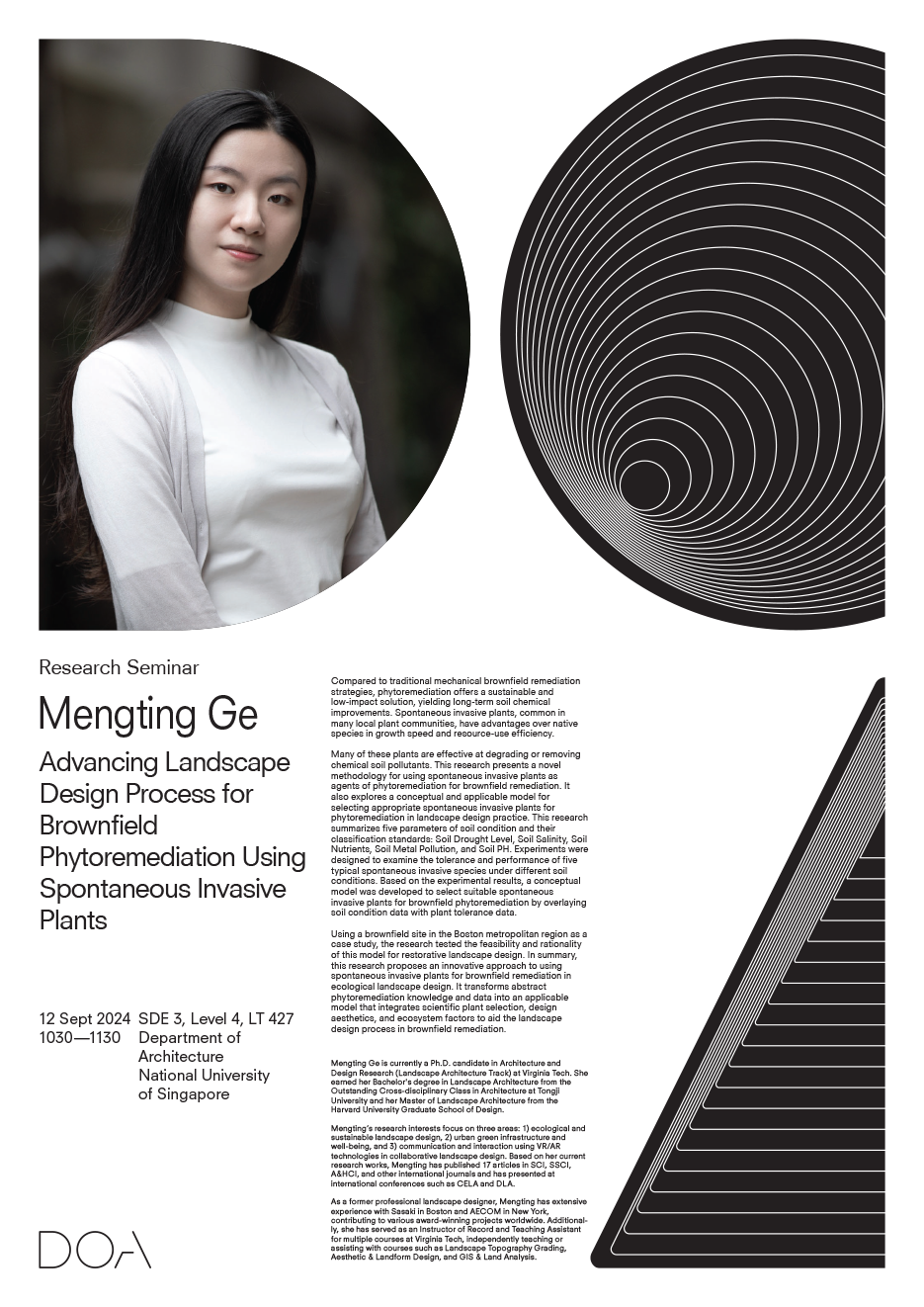Advancing Landscape Design Process for Brownfield Phytoremediation Using Spontaneous Invasive Plants
Name of Event/Lecture
Advancing Landscape Design Process for Brownfield Phytoremediation Using Spontaneous Invasive Plants
Name of Speaker
Mengting Ge
Location
SDE3 Level 4 LT 427

Date: 12 Sept 2024
Time: 10:30 AM –11:30 AM
Venue: SDE3 Level 4 LT 427
Advancing Landscape Design Process for Brownfield Phytoremediation Using Spontaneous Invasive Plants
Compared to traditional mechanical brownfield remediation strategies, phytoremediation offers a sustainable and low-impact solution, yielding long-term soil chemical improvements. Spontaneous invasive plants, common in many local plant communities, have advantages over native species in growth speed and resource-use efficiency.
Many of these plants are effective at degrading or removing chemical soil pollutants. This research presents a novel methodology for using spontaneous invasive plants as agents of phytoremediation for brownfield remediation. It also explores a conceptual and applicable model for selecting appropriate spontaneous invasive plants for phytoremediation in landscape design practice. This research summarizes five parameters of soil condition and their classification standards: Soil Drought Level, Soil Salinity, Soil Nutrients, Soil Metal Pollution, and Soil PH. Experiments were designed to examine the tolerance and performance of five typical spontaneous invasive species under different soil conditions. Based on the experimental results, a conceptual model was developed to select suitable spontaneous invasive plants for brownfield phytoremediation by overlaying soil condition data with plant tolerance data.
Using a brownfield site in the Boston metropolitan region as a case study, the research tested the feasibility and rationality of this model for restorative landscape design. In summary, this research proposes an innovative approach to using spontaneous invasive plants for brownfield remediation in ecological landscape design. It transforms abstract phytoremediation knowledge and data into an applicable model that integrates scientific plant selection, design aesthetics, and ecosystem factors to aid the landscape design process in brownfield remediation.
Mengting Ge is currently a Ph.D. candidate in Architecture and Design Research (Landscape Architecture Track) at Virginia Tech. She earned her Bachelor’s degree in Landscape Architecture from the Outstanding Cross-disciplinary Class in Architecture at Tongji University and her Master of Landscape Architecture from the Harvard University Graduate School of Design.
Mengting’s research interests focus on three areas: 1) ecological and sustainable landscape design, 2) urban green infrastructure and well-being, and 3) communication and interaction using VR/AR technologies in collaborative landscape design. Based on her current research works, Mengting has published 17 articles in SCI, SSCI, A&HCI, and other international journals and has presented at international conferences such as CELA and DLA.
As a former professional landscape designer, Mengting has extensive experience with Sasaki in Boston and AECOM in New York, contributing to various award-winning projects worldwide. Additionally, she has served as an Instructor of Record and Teaching Assistant for multiple courses at Virginia Tech, independently teaching or assisting with courses such as Landscape Topography Grading, Aesthetic & Landform Design, and GIS & Land Analysis.